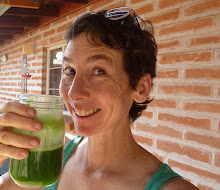
Estos días, me alegra que soy bilingüe, que puedo leer, escribir, pensar, y hablar en otros idiomas. Puedo usar el español, el françes, el inglés, y el japonés para comunicarme. Eso no significa que uso mis idiomas perfectamente—estoy muy lejos de la perfección--sino que continuo aprendiendo cada vez que uso mis lenguas (aún cuando uso el inglés). Estoy felíz porque dos o tres veces en los últimos seis meses, cuando fui a la biblioteca pública para sacar un libro popular, y no era disponible en inglés, podía prestarlo en español. Y que suerte vivir en Tucson donde se puede encontrar muchos libros escritos y traducidos en español. Hace unos meses encontré que hubiera tenido esperar unos meses por sacar uno de los 26 copias en inglés del libro nuevo de Esther y Jerry Hicks: El Fascinante Poder de la Intención Deliberada. En cambio, la traducción al español era disponible inmediatamente. Entonces tuve la oportunidad de mejorar mi español y aprender de la intención deliberada a la misma vez.
Así, hace unos días comenzé leer dos libros en español. El primer fue escrito en inglés, y al principio lo busqué en inglés: Amar Lo Que Es: Cuatro Preguntas Que Pueden Cambiar Tu Vida, escrito por Byron Katie y Stephen Mitchell y traducido por Mari Luz Hernández. Stephen Mitchell es un gran traductor de libros sagrados como el
Libro de Job, el Tao Te Ching, y el Bhagavad Gita, además de ser el esposo de Byron Katie. Una pareja muy interesante, yo creo, con una mescla fortuita del espiritual, el corporal, la sabiduria anciana (o sin tiempo....), y el intelectual-académico. La enseñanza que “Katie” nos ofrece, viene de su experiencia actual, la que ha vivido, no de los ancianos libros sagrados. En cambio, Stephen Mitchell tiene la experiencia tremenda de haber estudiado y traducido los textos clásicos de las tradiciones espirituales del mundo.
El segundo libro es un libro escrito originalmente en español por Don Miguel Ruíz.
Los Cuatro Acuerdos es bien conocido en el mundo inglés. En hecho, yo había leído artículos sobre el libro pero no el libro mismo. Entonces lo voy a leer.
Ustedes que leen español pueden ver que me queda muy lejos de ser "nativa" o completamente natural en cuanto a mi español. Estoy muy peresoza cuando escribo, y ya sé que puedo comunicarme bastante bien, entonces, apenas uso el diccionario.... y por eso lo hago muchos errores. Prefiero aprender por leer en español, escuchar a la música con letras españolas y a la radio mexicana, y hablar con gente hispano parlante como mis vecinos aquí en Tucson. En esta manera sigo aprendiendo.
****** Y mi traducción/And my translation:******
The advantage of being bilingual
These days, I’m happy that I am bilingual, that I can read, write, think, and speak in other languages. I can use Spanish, French, English, and Japanese to communicate. This does not mean that I use these languages perfectly—I am very far from perfection—rather that I continue learning each time I use my languages (even with English).
The reason I am happy to be bilingual is this: two or three times in the last six months, when I went to the public library to check out a popular book, and it wasn’t available in English, I could borrow it in Spanish. And, how lucky to live in Tucson where one can find many books written in Spanish or translated into Spanish. A few months ago, I found that I would have had to wait for months to take out one of the 26 copies of Esther and Jerry Hicks' new book in English,
The Amazing Power of Deliberate Intention. However, the Spanish translation was available immediately. Therefore, I had the opportunity to improve my Spanish while learning about deliberate intention.
So, a few days ago, I began to read two books in Spanish. The first one, written in English, was one I had wanted to read in English: Love What Is: Four Questions That Will Change
Your Life by Byron Katie and Stephen Mitchell, translated by Mari Luz Hernández. Stephen Mitchell is a great translator of sacred books like The Book of Job, theTao Te Ching, and The Bhagavad Gita, and he is Byron Katie’s husband. A very interesting pair, I think, with their fortuitous blend of the spiritual, bodily, ancient (or timeless) wisdom, with the intellectual-academic. The teachings that “Katie” offers us comes from her own lived experience, rather than from ancient sacred books. In contrast, Stephen Mitchell has tremendous experience studying and translating the classic texts of the world’s spiritual traditions.
The second book is a book originally written in Spanish by Don Miguel Ruíz.
The Four Agreements is a well-known book in the English speaking world, but I had only read articles about the book, not the book itself. So, now I will read it (in Spanish).
You who read Spanish can see that I am very far from being a native or completely natural in my Spanish. I am very lazy when I write, and I know I can communicate well enough, so I hardly use a dictionary…. And that’s why I make a lot of errors. I prefer learning by reading in Spanish, listening to music with Spanish lyrics, listening to Mexican radio, and speaking with Spanish speaking people here in Tucson, like my neighbors. This is how I continue learning.


1 comment:
Muy buen aporte. Saber hablar múltiples idiomas es una herramienta fundamental actualmente. El solo hecho de ser bilingüe abre el campo de posibilidades en numerosos ámbitos y especialmente en el plano laboral.
Post a Comment